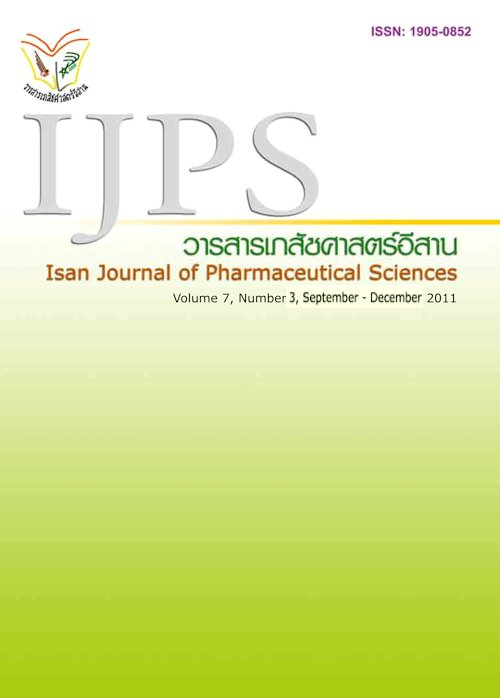Transformational Leadership of Heads of Pharmacy Department of Hospitals under the Offce of the Perma- nent Secretary,Ministry of Public Health
Main Article Content
Abstract
Introduction: The purpose of this survey research was to measure transformational leadership level of heads of pharmacy department of hospitals under the office of the Permanent Secretary, Ministry of Public Health. Methods: There were 2 sample groups: 1) heads of the pharmacy department in regional/general hospitals and community hospitals with more than or equal to 60 beds (325 persons); 2) pharmacists who were subordinates of the heads of department in regional/general hospitals and community hospitals (1,069 persons). It develops a measure of the transformational leadership Meehanpong (2004) with theoretical framework of transformational leadership, Bass (1985) and Avolio, Bass and Jung (1999). The leadership questionnaire consisted of three components: 1) Charismatic – Inspirational Leadership; 2) Intellectual Stimulation and 3) Individualized Consideration. Used to send mail. Result: It was found that: level of transformational leadership assessed by the Heads themselves and that assessed by subordinates were high ( = 3.93, S.D. = 0.36, = 3.74, S.D. = 0.62). Level of transformational leadership assessed by the Heads was higher than the level assessed by subordinates (P < 0.001). Self-assessed transformational leadership by heads of pharmacy departments in regional/general hospitals and community hospitals showed no significant difference. Most of the Heads were interested in improving their leadership by means of training, self-study learning, field studies and formal studies in university. In addition, there should, after the graduation, be continuous provision of leadership training emphasizing on knowledge, personality and competency.
Article Details
In the case that some parts are used by others The author must Confirm that obtaining permission to use some of the original authors. And must attach evidence That the permission has been included
References
Avolio BJ, Bass BM. Individual consideration viewed at multiple levels of analysis a multi-level framework for examining the diffusion of transformation leadership. Leadership Quart 1995; 6(2): 199 - 218.
Avolio BJ, Bass BM, Jung DI. Re-examining the components of transformational and transactional leadership using the multifac-tor leadership questionnaire. J Occup Organ Psych 1999; 1-24.
Bass BM. Leadership and performance beyond expectations. 1985.New York: The Free Press.Bass BM. Theory of transformational leadership redux. Leadership Quart 1995; 6(4): 463 - 478.
Bass BM. Personal selling and transactional transformational leadership. J PSSM 1997; 17(3): 19 – 28.
Bass BM, and Avolio BJ. Transformational leadership and organization culture. PAQ, 1993; 17(1): 112 – 121.
Bass BM, Riggio RE. Transformational leadership. 2nded. Mahwah, NJ: Erlbaum. 2006.
Booraphan C. Factors Influencing leadership of professional nurses in regional hospitals, The Ministry of Public Health. [Master of Nursing Science Thesis in Nursing Administration]. GraduateSchool: KhonKaen University; 2003.
ChaichalermpongW. Leadership development in professional pharmacist: Challenges in the new century. Document meeting: Leadership development in professional pharmacist. KhonKaen. Faculty of Pharmaceutical Sciences, KhonKaen University.2009.
Kinnares S. The relationships between leadership behavior of head nurses and organizational culture of nursing service department as perceived by staff nurses in community hospitals of region 6. [Master of Nursing Science Thesis in Nursing Administration]. Graduate School: KhonKaen University; 2003.
Limmahakhum C. The relationship Between leader-ship behavior of head nurses and motivation in clinical pratice of staff nurses at private hospitals northeastern region. [Master of Nursing Science Independent Study in Nursing Administration]. Graduate School: KhonKaen University; 2003.
Meehanpong P. Relationships between transformational leadership of head nurses, organizational citizenship behavior and effectiveness of patient units as perceived by staff nurses, general hospitals. [Master of Nursing Administration]. Faculty of Nursing: Chulalongkorn University; 2004.
Pitaknitinan K. Relationship between the leadership competency of the chief of pharmacydepartment and the achievements of the hospital drug safety standards. [Online].2007. [cited 2009 Aug 1] Available from: http://www.rsu.ac.th/grad/thesis/graduate/Abstract_Thesis/412-0027Abstract.pdf.
Salangsing D.The ideal characteristics and roles of creating the Thai leadership dentist in the next decade (2002-2013).[Master of Science Thesis in Dental Public Health].Graduate-School: KhonKaen University; 2004.
Summapan N. Leadership: Driving force behind the organization to excellence.1st ed. Bangkok: Innographic; 2003. 1-5.
The Association of Hospital Pharmacy. Standard of professional pharmacist. [Online].2006. [cited 2009 Aug 1] Available from: http://www.thaihp.org/index.php?lang=th&option=contentpage&sub=29.Zilz DA, Woodward BW, Thielke TS, ShaneRR, ScottB.Leadership skills for a high – performance pharmacy practice. Am J Health Syst Pharm2004; 61: 2562-2574.

